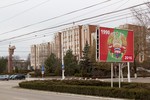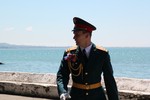Nagorno Karabakh: the reasons for a war
The long-term reasons for the conflict in Nagorno Karabakh are well known. But what caused such an extensive military intervention as the one we are seeing these days, over 25 years after the ceasefire? And what can and should be done now? An analysis
Russia hacked: problematic sources for insights on conflicts in Ukraine and the South Caucasus
In recent years, high-level leaks and hacks have featured prominently in media reporting. Russia has been repeatedly blamed for carrying out cyber-attacks against a variety of actors in Western countries, including the US Democratic party and then-presidential candidate Emmanuel Macron in France. However, Russian government actors have themselves been repeatedly hacked in recent years, including by alleged Ukrainian hacker groups and others (e.g. #SurkovLeaks). People associated with the de facto authorities in the Donbas region have also been hacked.
The EU and De Facto States: Adjust Expectations, Support Small Steps
As of early 2019, policy-makers looking for pragmatic and forward-thinking approaches to meaningful engagement with de facto states in the EU’s neighbourhood should keep as their point of reference Thomas de Waal’s recently published book “ Uncertain Ground: Engaging With Europe’s De Facto States and Breakaway Territories”. He argues in favour of a “more sophisticated rules of engagement within a framework of non-recognition”, suggesting that the international community should “be prepared to engage more directly with de facto authorities on a give-and-take principle,” and further presents a number of specific recommendations on issues such as higher education, health, minority rights, and trade (in a previous commentary for ISPI, I have similarly argued in favour of a pragmatic, nuanced approach to increased engagement focusing on human rights and trade).
Developing a New Research Agenda on Post-Soviet De Facto States
The scholarship on post-Soviet de facto states has structurally focused on issues related to their contested status, and has long …
Ten Years After the War in South Ossetia, Time to Embrace Nuance
Ten years after the war between Georgia and Russia in South Ossetia, in a context where grand bargains and comprehensive agreements are difficult to imagine, it is time to embrace a nuanced approach to conflicts in the post-Soviet space. Pragmatic and humane solutions that acknowledge local agency are the way forward
The one book I recommend reading on the 10th anniversary of the August 2008 war between Georgia and Russia in South Ossetia is Gerard Toal’s Near Abroad.
After a new president came to power, what happened to Transnistria’s media?
I have analysed Transnistrian online media 18 months after Vadim Krasnoselski came to power. I found clear evidence of selective removal of “unpleasant” old news items, but no evidence of mass dismissal of journalists.
In Transnistria – a de facto independent state located within the internationally recognised borders of Moldova – in the aftermath of the December 2016 presidential vote, the risk of increased tensions seemed to be particularly high, as Vadim Krasnoselski – who won the vote – had threatened to jail the incumbent Shevchuk on live TV during a pre-electoral debate, and people in top positions close to Shevchuk knew they had a lot to lose from an unfavourable electoral outcome.
Non-recognition is the symptom, not the cause
My PhD thesis - What is the effect of non-recognition? The external relations of de facto states in the post-Soviet space - is now online and can be downloaded freely.
Aware of the limited allure of a 300-pages pdf file, I decided to outline here some key outcomes (not necessarily the conclusions), as well as some additional thoughts.
1. Non-recognition is the symptom, not the cause First, a one-paragraph summary of my conclusions.
Conceptualising Post-Soviet de facto States as Small Dependent Jurisdictions
De facto states, according to the most established elaborations of the concept, by definition strive towards full-fledged, …



